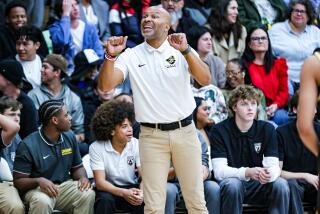STARTING OUT : In a Game of Numbers, Jackson Says New Broadcasters Should Think Small
- Share via
Keith Jackson has some practical advice for anyone who is thinking about becoming a sportscaster.
“Go to a station in a small community where you are not encumbered by labor unions,” said Jackson, the only man to win five consecutive Sportscaster of the Year awards.
“That way, you can try everything, and you just might find out that you’re a better writer, or producer, or director, or cameraman--or maybe better off out of the business.”
Most of all, Jackson says, “Learn to write. If you can’t write, you can’t talk.”
As with most professions, an entry-level job isn’t easy to find in broadcasting. The competition is intense. Even small television stations are swamped with applicants for the weekend sports anchor job. This month, when a cable network was looking for a color commentator for Continental Basketball Assn. games, it received more than 1,000 applications.
George Griffin was one of them. Griffin had studied broadcasting at Cal State Northridge and graduated last May. CSUN doesn’t teach sports broadcasting, but like most young men, Griffin grew up around sports and followed UCLA basketball. He also did sports reporting for his Ladera High School paper and for a small chain in the South Bay area.
The cable company held auditions at 15 sites around the country. Griffin won the regional competition in Denver and was flown to New York for the finals. He was put in a room with the play-by-play man and shown a video tape of a basketball game. He had to be clever and analytical.
“I did well, but I don’t think I had enough enthusiasm in my voice,” said Griffin, 23. “I didn’t get the job. I think they were looking for a hot-dog type. I’d rather be a good, solid sportscaster.”
Griffin considers himself a journalist, which may put him at a disadvantage when he tries to get a TV job. Local sportscasters are often rah-rah boosters for the home teams.
Said Jackson, “They shouldn’t be, but they let themselves be intimidated by the local clubs or the station’s sales department.”
If Griffin does become a sportscaster, he said, he’ll want to write his own material. “Anybody can get up there and look cute and read the Teleprompter,” he said. “I want to do in-depth stuff.”
Jackson knows, however, that sportscasters, especially young ones, are usually under the thumb of producers, who set the tone of the programming. Also, he said, TV stations don’t regard sports as hard news, and sportscasters “have to fight to get the time and equipment to do stories.”
It gets frustrating, he said, when “the damn weatherman is a bigger star than you are.”
More to Read
Go beyond the scoreboard
Get the latest on L.A.'s teams in the daily Sports Report newsletter.
You may occasionally receive promotional content from the Los Angeles Times.










